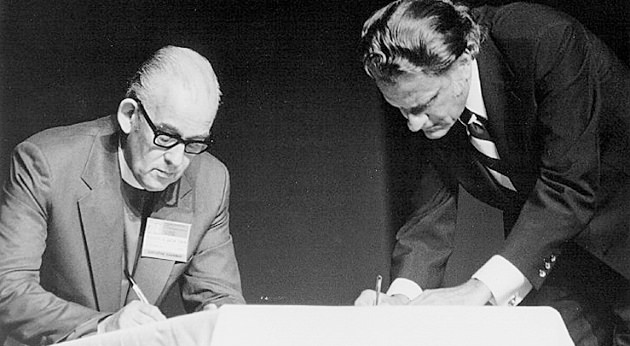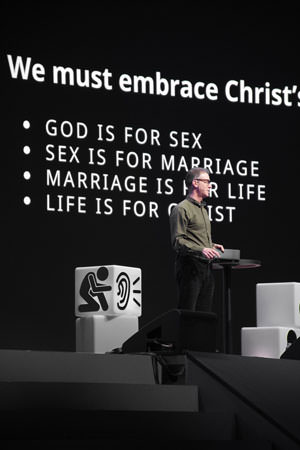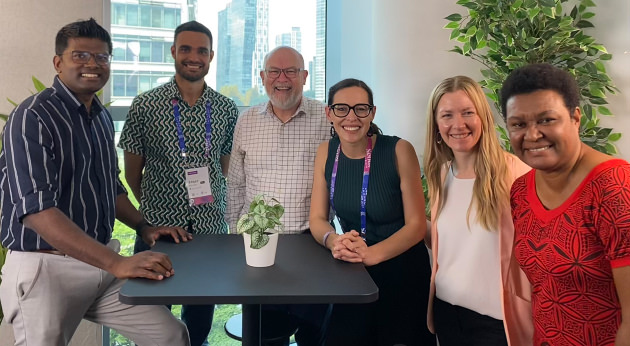The Lausanne Movement has just celebrated its 50th anniversary in Korea with the Fourth International Congress on World Evangelization.
Mark Thompson and I were privileged to be able to attend alongside quite a number of others from Sydney, Australia and Oceania: celebrating this moment, recalling the movement’s history and assessing its impact.
In 1974, the first congress was held in Lausanne, Switzerland. The driving forces behind it were Billy Graham and John Stott. Sydney’s Bishop Jack Dain served as the executive chairman of the congress, so the Diocese of Sydney has been significantly involved in the Lausanne Movement from the start.
From its beginnings, the movement has been about evangelism and mission. At the first Congress, Ralph Winter introduced the term “unreached people groups” and called on churches to give them priority in our evangelistic efforts. Billy Graham identified three challenges that called for a fresh zeal for evangelism and mission: “the loss of the authority of the message of the gospel; the preoccupation with social and political problems; and the equal preoccupation with organisational unity”. Graham’s observations show amazing insight and his call to give fresh attention to the Great Commission in the light of them is something we need to hear and heed today.
the Great Commission has remained at the centre of the movement’s message...
Other voices in that first congress, including Samuel Escobar, Rene Padilla and even Bishop Dain, sought to emphasise the importance of social engagement and responsibility alongside the preaching of the gospel. Our concern for our neighbours is spiritual but more than spiritual. In the spirit of James 2:15-16 we know that men and women are lost without the salvation found only in Christ, but they also live in a world of tangible physical need that we cannot simply ignore. The two belong together, even if it is only the preaching of the gospel that sees people saved for eternity.
 Bishop Dain and Billy Graham sign the Lausanne Covenant in 1974 - Courtesy of the Billy Graham Archives
Bishop Dain and Billy Graham sign the Lausanne Covenant in 1974 - Courtesy of the Billy Graham Archives
It is fair to say there has been a resultant tension within the movement between those who endorse phrases such as “the whole gospel for the whole world” and others who warn about the danger of confusing the gospel of Christ crucified and risen with its consequences in a way that can end up minimising or even obscuring the gospel itself. Nevertheless, largely thanks to the Lausanne Covenant, the landmark document prepared at the first congress (largely under the influence of John Stott, chairman of the theology working group), the Great Commission has remained at the centre of the movement’s message.
The fourth congress, held in September in Seoul, follows the second, held in Manila in 1989, and the third, in 2010 in Cape Town. The theme of Lausanne IV was “Let the churches declare and display Christ together”.
A mixed experience
Our experience of the conference was mixed. I have been describing the week as a seven-day all-you-can-eat spiritual buffet. I couldn’t get enough of some dishes while others provided only a little nourishment.
 Jeri Jones Sparks, the Assistant Minister for Outreach at St James, Croydon hosting a session
Jeri Jones Sparks, the Assistant Minister for Outreach at St James, Croydon hosting a session
There is little doubt Lausanne has been a significant force within the Christian world for half a century. However, in the past 25 years, it has also faced challenges that give pause for thought.
Despite strong pronouncements at each congress and various other regional consultations, there is a lingering perception that Lausanne has not translated its theological and missiological insights into widespread, practical impact. The movement excels at articulating a vision, but its ability to spur tangible action at the grassroots level seems to fall short. Many churches are not fully engaged with Lausanne's goals or are unaware of its initiatives.
Many churches are not fully engaged with Lausanne's goals or are unaware of its initiatives.
I believe an opportunity was missed by the conveners of this year’s congress when many church leaders were not invited to attend. Instead, room was made for Christian representatives of business, especially from the technology sector, and from parachurch organisations. Another lost opportunity was to encourage buy-in in the congress statement. Instead, the delegates were presented with a pre-packaged and finalised statement as they arrived in Seoul.
Leading up to the congress there was a lot of social media criticising Lausanne for not keeping pace with the evolving landscape of social issues, such as racial justice, climate change, economic inequality and gender rights. I fear the executive leaders may have listened a little too much to this sort of criticism and referred too little to Billy Graham’s three clear warnings from 50 years ago. While they spoke of maintaining the movement’s primary focus on evangelism and discipleship, speakers continued the confusion that was so concerning in Cape Town 14 years ago, where social justice, climate care, equality and affirmative action were presented as part of “the whole gospel” and our “holistic mission”.
Grace and gentleness
As might be expected, one of the most powerful contributions was provided by the Rev Canon Vaughan Roberts from St Ebbe’s in Oxford. Vaughan’s grace and gentleness on the issue of human identity and sexuality was a talking point throughout the week. His appeal to 1 Corinthians 5 – to remind us that we have no business judging the world and we should be vitally concerned about discipline within the church – his own testimony about an identity found in Christ and not in our sexual nature, and his memorable outline that summarised the issues magnificently, all made it a very edifying presentation. He was applauded by the 5000-strong audience at every point, saying that God is for sex, sex is for marriage, marriage is for life, and life is for Christ.

Another stirring moment was when we heard from Will Graham, Billy Graham’s grandson. He called on the congress to recommit to the Lausanne Covenant that was established on the authority of God’s word.
we must never neglect persuasive preaching, personal soul-winning and the necessity of proclaiming the Good News.
“The necessity of proclamation evangelism is as great today as ever,” Will said. “Even though we’re living in a world that at every turn is working to cancel Christ and the Bible in order to exalt itself, we must say, ‘Not on our watch! … It’s not the time to give up. It’s not the time to retreat. It’s not a time to turn inward… Now is the time to stand boldly for Jesus Christ, to preach Christ unashamedly and in the power of the Holy Spirit.”
Evangelism is not the only work of the church, Will said, but we must never neglect persuasive preaching, personal soul-winning and the necessity of proclaiming the Good News.
Moments like these are unique opportunities to speak with people from all over the world, and the congress provided great opportunities to meet and share with people and about the mission of our Diocese and our college.
 Bishop Edwards with other international delegates
Bishop Edwards with other international delegates
Mark Thompson had fruitful conversations with people from Pakistan, India and Argentina, who all wanted to send students to Moore College – despite the importance of theological education for global mission being a noticeable omission from the program. I spent some time with representatives from Mongolia, Finland, Myanmar and Nigeria who were keen to learn about doing evangelism through parish ministry. Sadly, it seems, this is becoming a less common way of reaching people. What a privilege and joy to speak of what we have seen God do here at home. Who knows what opportunities might spring from such conversations?
“Persecution never kills the church but a compromised gospel will”
Such moments also provide great reminders of how we must never neglect to remember brothers and sisters in other places who face persecution for their faith in Christ. It was sobering and exhilarating to hear an Iranian pastor, having served years in prison for his faith, say, “Persecution is part of the story, not the end of the story”. It was echoed by Dr Patrick Fung, the Global Ambassador for OMF International, who added: “Persecution never kills the church but a compromised gospel will”.
So, our Diocese has been involved in the movement from the beginning and, I believe, still has an opportunity to influence it for good in the future. But that will mean getting alongside the leadership of the movement and not neglecting it.
The Rt Rev Chris Edwards is Bishop of the Northern Region in the Sydney Diocese.

































